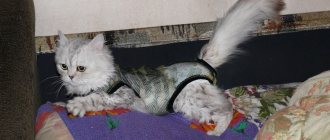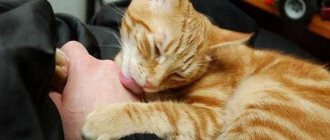Cats, unlike dogs, are more reserved animals who do not particularly welcome guests into the house and prefer to hide from them in far corners. This is largely due to the fact that, by nature, mustachioed pets are introverts. However, inexperienced owners may not be aware of this and therefore become concerned if their cat hides in dark places, attributing this behavior to illness. The article will analyze in detail the reasons for this habit, and also provide recommendations on how to rid your furry pet of it.
Signs of a physical illness
Although animal psychologists are sure that in most cases, hiding in a secluded place is associated with the character of the cat, one should not discount such an unpleasant factor of such behavior as the presence of pathological processes in the body. This is especially true in cases where the habit arose suddenly, although the cat had not done anything like this before. That is why the owner must know which behavioral reactions are characteristic of his animal and which are not.
Veterinarians advise owners who are concerned that their furry friend has begun to hide in a dark corner to pay attention to such painful symptoms that appear in parallel, such as:
- The animal does not eat anything for a long time.
- Uncontrollable thirst or, conversely, the pet practically does not drink water.
- The pet began to sleep for a long time.
- Problems with the gastrointestinal tract in the form of diarrhea.
- The cat is vomiting severely.
- The appearance of the coat deteriorates, loses color, and the fur becomes lumpy or falls out.
If the owner notices one of the above signs, which has arisen in conjunction with the fact that the cat is trying to hide away from prying eyes, then it is necessary to urgently take him to a veterinary clinic for an examination.
Spectacle
For those who are just beginning to experience the delights of living in the same house with a cat, it is useful to know and remember that their tailed and mustachioed friend is a predator who loves to ambush other animals in natural conditions. Therefore, if you find a cat sitting in a dark corner, it makes sense to think that maybe he is just lying in wait for his next “victim.” And it doesn’t matter that she happens to be a family member passing by.
In such cases, at least you can do everything to prevent the animal from setting up an ambush in places where it is dangerous for it to be. Let's say, in ovens, washing machines or dishwashers, that it is in the order of things to pay a little attention to cabinets and bedside tables with closing doors - (unexpectedly, did you get in there? Otherwise, you won’t be able to get out, and even where, if the owners are at home and save the hunter from captivity.
Psychological discomfort
Cats do not have a strong nervous system, so they are extremely vulnerable to stress disorders. If the owner has wondered why the cat is hiding under the sofa or in the closet, then the answer to this may be strong nervous experiences that the animal has recently undergone. These include:
- moving to a new place of residence, home renovations or long travel;
- sometimes the reason for hiding from the owner is a trip to the veterinarian, after which the cat stops trusting his “boss”;
- the appearance of a new pet, child or simply a stranger on the cat’s “territory”;
- complete lack of communication between the cat and the immediate owner;
- often cats hide because one of the family members treats them badly;
- If a cat escaped from home, but was returned back, then it needs some time to recover from the stress it experienced. As a result, she may hide under the bed or just sit behind a chair. This is nothing unusual, just give her time to adapt.
The owner of the animal must clearly understand that prolonged exposure to stress can cause various pathological processes in the cat’s body that negatively affect its health. First of all, the stomach and heart suffer; over time, the immune system weakens, and this makes the entire body vulnerable. Therefore, you need to save your pet from nervous shock as quickly as possible.
It's not the blanket, it's the owner!
However, most often a visit under the blanket is simply the pet’s desire to thank you for your love. When a cat cuddles, purrs, and tramples its owner with its paws, it thus expresses the highest degree of gratitude for the kindness that a person does for it, and a blanket is simply a pleasant decoration for expressing tender feelings.
If you don't want your cat to come into your bed or sleep under your blanket, gently let her know this. Do not scold an animal that is hiding in the warmth.
Take your pet in your arms, take it to another room, caress it and treat it to something tasty. Make another place in the house a permanent spot for spending quality time together. Also, give your cat her own warm blanket that she can hide under if she wants.
Svetlana Mosolova
Pregnancy
Pregnant cats sometimes behave very strangely. However, it is important to know that during this period their instincts, laid down by nature itself over thousands of years of evolution, become more acute. In particular, the expectant mother begins to take care of kittens even before the moment of their birth. This is expressed in the form of the fact that she is actively looking for a secluded nest where no one will disturb her.
Caring owners should foresee this moment and arrange such a nook for the animal. The ideal option is a regular cardboard box lined with warm material at the bottom. Such a measure will save owners from searching in the future for squeaking kittens, which the fluffy beauty will hatch in the most inaccessible place.
During pregnancy, cats often become irritable and aggressive; they can meow loudly and even hiss at the owner. Therefore, it is better to save them from the annoying attention of children, as well as loud sounds, so as not to once again disturb the animal, which is already on the verge of nervous exhaustion.
Seclusion due to illness
Sick and wounded animals instinctively hide, because they are unable to actively resist and withstand danger. Domestic cats who feel depressed do the same thing, shutting themselves off from the world and immersing themselves in their pain. They may avoid human company, but go to the hospital under a blanket, especially with chills and elevated body temperature.
Refusal of food, lethargy and reluctance to leave the shelter should alert the owner, since the stronger the disease, the weaker and more apathetic the animal becomes.
Age
If at an early age a cat runs away to dark places because it is easier to take the owner by surprise, then with older animals the situation is not so clear. A decrepit pet loses its senses, it is no longer attracted to active games and noise, so it is not surprising that it wants to sleep away from all the fuss.
Be respectful of your old pet's needs. He needs more time to recuperate, so try not to make noise in the place where your tailed friend prefers to rest. Veterinarians note that if an elderly animal is not given plenty of rest, it will significantly shorten its life.
Why does a cat need to hide?
The desire to hide in a dark place for a while is quite common among domestic cats. The hunter's instinct prompts them to take a position in a secluded corner so that they can calmly observe what is happening without being noticed. In other cases, especially small kittens, they want to be in a warm, cozy “nest”, where they are comfortable and safe. Fur babies grow and sleep a lot, so they need proper rest. Constantly playing TV and other noises do not provide the opportunity to have a good rest. Truly deep sleep is only possible in darkness and complete silence.
It should not be surprising that cats find secluded corners in completely different places.:
- closet,
- box,
- under the bed or sofa,
- washing machine drum,
- on the shelf,
- behind the battery,
- under the owner's blanket.
If the cat hides constantly, then you need to buy one for it in a special store or make a house yourself. Fluffy pets love such shelters. This is connected not only with psychology, but also with physiology. Cats often sleep curled up. When sleeping in a confined space, they can lean their back against the wall of the house, thus relaxing their muscles.
Correction methods
So, above it was described in detail why a cat hides in dark places at home. Now it’s worth moving on to questions about how to correct this behavior or make it less risky for the animal. In this regard, experts offer a number of effective recommendations, depending on the cause of the behavioral act:
- In case of stress disorders, it is necessary to completely eliminate the reason that makes the cat want to hide in the far corner. In addition, it is permissible to use light sedatives, presented in the form of tablets and drops, which the pet should drink at a time when stress is especially strong.
- If the cat was hiding due to any disease, and in addition the owner noticed aggravating symptoms, such as diarrhea, vomiting or severe thirst, then it is necessary to take it to a veterinary hospital.
- In cases where the need for privacy in dark places is related to the pet’s character traits, you should arrange a safe and quiet corner for him, where he will feel comfortable when strangers come into the house.
- During pregnancy, provide the expectant mother with a nest, which is quite simple to build from the most common means at hand. Then show it to the cat, let her sniff it and examine it carefully. If she didn’t like the place, then move the structure to the room where she already gave birth or where she often went in search of a safe shelter.
Finally, I would like to say that in most cases there is nothing wrong with hiding a furry friend in secluded places. The owner must treat such “oddities” of his pet with understanding and is obliged to protect him from a fatal accident, expressed in getting into the drum of a washing machine along with laundry or being locked in a closet. If the habit appeared abruptly and is accompanied by painful signs, then it is worth showing your pet to a doctor, this will protect him from the risk of dangerous pathologies.
Secretive cat nature
Wild cats are predominantly nocturnal predators, able to navigate well in low light and come out to hunt at dusk. In the morning, the animals return to their daytime roosts, located in hidden places, such as:
- rock cleft;
- fork of branches in dense foliage;
- tree hollow;
- earth hole;
- hole under the roots.
Pets. The activity of domestic cats is also confined to the dark time of day. The mustachioed tabbys devote daylight hours to lazy pastime, getting up only to have a snack, visit the litter box, and lick themselves.
Kittens can hide:
- in the closet among bedding and things;
- on a bookshelf;
- in a cardboard box (read more about why cats love boxes);
- in a pan, vase, empty flower pot;
- in the washing machine;
- in a laundry basket;
- under a closet, sofa or bed;
- behind the central heating radiator;
- behind the chair;
- under the blanket.
In addition to a light half-sleep with closed eyes and the “inner guard” turned on, cats have real deep sleep, which is necessary to maintain health and restore strength. However, such complete relaxation is only possible in complete safety, silence and darkness. That is why mustachioed striped creatures choose hidden dark corners for themselves.
According to research by zoologists, the animal feels comfortable when the walls of the shelter touch the body. That’s why a cat’s favorite places to sleep are never too spacious.
Anti-stress nook
Personal space is of particular importance in a stressful situation, since a wise protective instinct commands cats to sit in a secluded place until the threat has passed. A disturbed cat will dive into its house, and if there is none, into one of its favorite inaccessible corners of the apartment.
Sources of fear. A loud noise or a previously unseen object can frighten an animal. So, a real shock for a timid pet will be a major repair or installation of large household appliances. Cats also quickly get tired of overly active guests and run away to the most distant dark room. Stress can be triggered by a move, an exhibition or a visit to the veterinary clinic.
Help for kids. The need to scoot and hide in a cozy den is characteristic of cats of all ages, but the psyche of small kittens is especially sensitive, instinctively striving for something warm and soft, so similar to the fluffy side of their mother. In order for the baby to quickly adapt to the new home, it is recommended to purchase a sleeping place in one of the configurations at the pet store:
- closed soft bed;
- frame house;
- “tunnel” or “hole” with a rounded mouth;
- an envelope or sleeping bag with a flattened entrance.
It would be great if the inner surface of the “den” is lined with plush or faux fur. The walls of a warm and soft shelter muffle extraneous noise and light, allowing the kitten to sleep peacefully. To prevent your baby from feeling lonely, you can put a plush toy or bedding in the house that smells like a native nest.
Cats that require special care. In addition to kittens that have just been weaned from their mother, the following are prone to “games of hide and seek”:
- timid and nervous individuals;
- young cats in the presence of an adult and confident fellow tribesman;
- cats picked up on the street and not used to living in a house;
- animals that have been mistreated and physically harmed at the hands of humans.
Owner actions.
The owner is not recommended to forcibly disturb the peace of an animal hidden in the saving darkness - this is how the body restores psychological balance.
Unsocialized wild animals can “thaw out” only with time and gentle handling. With a long “reclusion”, you can try to lure the cat out of the “den” with the help of a toy or treat.
Hiding, provoked by the clarification of the relationship between two individuals, will resolve itself when the animals get used to each other and establish the rules of the hierarchy. To avoid provoking a fight, it is recommended to install two different trays, two houses and two food bowls in different parts of the house.
Hunting games
Wild animals. Representatives of the cat family belong to ambush predators, not adapted to long pursuit of prey, and therefore hunt from shelters. Lions lie down in front of a herd of antelopes in the grass of the savannah, a spotted jaguar is hidden by the play of light among the branches, and a domesticated murka is spread out on the asphalt, sneaking up on a pigeon.
Domestic individuals. The mustachioed striped one, which does not leave the apartment, has fun through hunting games, suddenly jumping out of its secret hiding place. Especially young, uncastrated animals and representatives of hybrid breeds obtained by infusion of real “wild blood” like to go on safaris.
Any moving object can be the object of the hunt: from a ball made of candy foil to a shaggy vacuum cleaner and the ankles of the hostess. The simulation of an attack and capture of the “victim” turns out to be quite realistic, using the entire cat’s arsenal of 30 teeth and 20 claws.
What should the owner do? To wean your pet from making unexpected attacks, it is recommended to work with it more, socializing it and teaching it to play in a “civilized” manner. An abundance of various fun activities will help to throw out the hunting ardor, and a game complex and targeted training will teach the energetic cat intricate tricks.
Some cats have a genetic tendency to hide food supplies in secluded corners because their wild ancestors did not always manage to eat regularly.
Main reasons for seeking shelter
There are many explanations for why a cat hides in dark places. In some cases, the shelter is not always truly dark, but simply cool or, conversely, warm. There may be several favorite places for a pet, often they are well known to the owner. It is advisable not to disturb the animal at such a moment, because sometimes he needs to be alone with himself.
Why does a cat try to be invisible, let's name common reasons:
- character trait;
- the presence of another, older cat in the house;
- the need to calm down after suffering stress;
- anticipation of the appearance of offspring;
- desire to play;
- desire for security.
Timid by nature
By nature, some cats are sociable, while others prefer loneliness. Those who belong to the second category instinctively try to be “in the shadows” more often, which guarantees safety. Such a kitten will not sleep on a wide sofa with its tummy up, with its paws spread to the sides. Also, he will not once again catch someone’s eye. You can force him to come out of hiding with gentle words, a favorite treat, or a bright, entertaining toy.
If the cat is hiding, then you should not lure it out or put pressure on it. Perhaps something alarmed her, someone scared or offended her. She will go out on her own when she considers it necessary, wants to eat or take a walk. If you do not allow the predator to avoid an unpleasant situation, then its anxiety will only intensify.
Trying to get peace and comfort, even sociable cats hide. They may find a place for themselves in the linen closet or on the cool wooden floor under the bed. It all depends on whether the pet is cold or hot.
Away from the Boss
The presence of another cat or an older cat in the house causes the younger cat to hide more often. The owner can create a maze of boxes especially for him, through which he can easily get to a bowl of food or tray. The boxes must have multiple entrances and exits so that you can escape in time, avoiding a dangerous or unwanted collision with your opponent.
The cat is in pain or preparing for it
If a terry pet hisses at the owner for no reason, there is a possibility that the cat is sick. Or maybe he seems to be very worried, because it is difficult to explain why a cat hisses for no reason. A meowing friend may have a number of medical conditions that cause irritation, for example:
- epilepsy;
- severe poisoning;
- hormonal changes occur in the cat’s body;
- the cat was injured;
- the animal has developed toxoplasmosis or other iatrogenic disease.
When an animal is sick, it is afraid of a person; it even cries at the touch of its owner. It does not want to be in trouble and is afraid that the owner will cause pain without wanting it.
They're just playing
And, of course, almost all cats love to hide in randomly left bags, boxes, and sometimes even vases and pots. Since in nature these animals hunt from ambush, this form of behavior is simply a “game of hunting,” like most games of predators. There is nothing to worry about here, except for one very important aspect. Before you turn on the washing machine, clothes dryer or oven, make sure there is no tailed surprise lurking there. Let cat hide and seek be just pleasant fun!
Svetlana Mosolova
What to do if the pet does not return for a long time?
If a cat has disappeared, it is necessary to take search measures: ask neighbors and post notices.
If it happens that the cat goes on a spree, you need to take immediate action. There is no need to wait for the pet to come on its own; this may not happen. In such a situation, there is only one way out - to start persecution as soon as possible. You need to leave the house and ask neighbors and surrounding residents. Maybe someone saw the animal on the street or took it for themselves. It is recommended to place an advertisement. This can be done in a newspaper, on the Internet, written by hand and hung on poles. You must provide a detailed description of the animal and attach a photograph. If the cat, upon coming home, runs away again after a while, then you need to purchase special address cards. They are attached to the pet's collar and contain the owner's name, address, and phone number. A modern method that can be done is microchipping a cat. It does not cause discomfort to the animal. A microchip is inserted under the skin and, if something happens, information about the location is read from it.
Why do cats hide in dark places?
Cats, unlike dogs, are more reserved animals who do not particularly welcome guests into the house and prefer to hide from them in far corners. This is largely due to the fact that, by nature, mustachioed pets are introverts. However, inexperienced owners may not be aware of this and therefore become concerned if their cat hides in dark places, attributing this behavior to illness. The article will analyze in detail the reasons for this habit, and also provide recommendations on how to rid your furry pet of it.
When to be wary
If a cat begins to hide in dark, cool places, then this is an alarming and not a very good sign. It is possible that in this way she is trying to get rid of high body temperature.
The increase in temperature is a consequence:
- scared, scared
- physical activity,
- hot weather,
- poisoning,
- acute pain.
This condition quickly normalizes. But if the temperature rises sharply by several degrees and does not subside for a long time, then this is a sign of the development of pathology. In this case, the animal must be urgently shown to the veterinarian.
How to understand that a cat is not feeling well. At these moments, her behavior changes sharply, she stops eating, sleeps a lot, does not want to use the litter box, meows pitifully, hides in a dark place - this signals the onset of the disease. Other symptoms may include diarrhea, vomiting, mucus from the nose and eyes, and hair loss. When an animal tries to perch on a tile or cold floor, such behavior indicates its poor condition. Most likely, the pet needs medical attention.
As cats age, they increasingly desire privacy; they are irritated by noise and bright lights, so they take refuge in dark places. Old animals may partially lose hearing, vision, sense of smell, or become ill.
Many furry pets love to climb into bags and boxes; some manage to lie down in a vase or pan. This should not cause concern to the owner. You just need to be careful not to move the chair or chair abruptly, as the animal may sit under it and get hurt. Before turning on the stove or washing machine, first look inside to see if there is a fluffy ball there. Try not to let the cat's fun with hide and seek turn into a tragedy. Complete mutual understanding will be the key to a pleasant life together.
How to get your pet to sleep longer with you
If you want your pet to stay in bed with you until the morning:
- Buy dark, dense curtains that let little daylight through. The morning sun's rays will not be able to disturb the pet, since thick curtains will create twilight.
- Don't give your cat food right after you wake up. She will get used to you feeding her on demand and will not let you sleep if she gets hungry at night.
- When your cat tries to wake you up early in the morning, don’t react. Over time, such actions will become a habit for her, and you will have to wake up at a time when she wants it, and not you.
- If the cat does not sleep or wakes up at night, do not let him rest during the day. Add activity to his life: play more, walk with your pet. Tired during the day, the animal will sleep soundly all night.
How to understand a pet
To understand your pet, you need to love it and watch it. And then it won’t be difficult to translate her hissing into human language.
If a cat has huddled in a corner, hisses, and has its ears flattened, it is most likely scared. The animal is looking for a safe corner where it can hide. The fear will go away on its own, you need to leave the pet alone
Excessive attention can cause even greater panic and then aggression.
Is the cat in a high stance, holding one paw raised and hissing, are its ears not flattened? This is a signal that the cat is now going to attack the one he has chosen as the target of the attack. It's better to move away from him.
A cat's hiss can be difficult to explain. There is no danger, the owner strokes his pet, and in response there is hissing and aggression. What should you think about? Perhaps the animal is sick, and touching or stroking causes even greater pain
Alternatively, the cat is in a bad mood, she is tired, and human attention seems intrusive to her.
What can confirm the presence of the disease? This is apathy, lack of appetite, change in normal behavior. You shouldn’t wait to see how it all ends; it’s not difficult to take your pet to the veterinary clinic to find out the problem.
Fear of light
Perhaps the pet is simply afraid of light. This is the norm if we are talking about a kitten or a pregnant cat.
The cubs are born completely blind. Their eyes are closed because they are not yet formed to meet the light. The pupils, which can dilate or contract, are responsible for the perception of light. The pupils of kittens that have just opened their eyes cannot adjust to the brightness of the light, so you can often notice how babies hide in dark places, and sometimes simply turn their faces away from the lighting fixtures. This phenomenon will pass when the animal grows a little.
Cats that are preparing to become mothers change their behavior: some become more sociable, others diligently avoid human society. But in one thing they are the same: when the birth approaches, they want to build a nest for themselves.
Special Conditions
If a pregnant cat begins to hide in dark places, it means that kittens will soon be born. This is absolutely normal behavior of a female before giving birth - she is looking for a secluded place to organize a safe nest for herself and her future offspring. It is easier for the owners to equip the future mother with a cozy box in a secluded corner, so as not to later pull the kittens out of a hard-to-reach crevice into which the mother in labor can hide.
There is also an alarming reason why a cat hides in dark places. Most cats are stoic by nature and are good at hiding their pain. Therefore, if your cat does not eat, hides in dark places, meows a lot, sleeps more than usual, or walks past the litter box, you should be wary - this may be a sign of illness. Other alarming symptoms are vomiting or diarrhea, lethargy, discharge from the eyes or nose, and hair loss. In this case, there is only one way - to the veterinarian.
The desire to be alone with oneself often occurs in old cats, which is a natural consequence of fading brain function, weakening of hearing, vision, olfactory reflexes and, again, very often, developing diseases.
Stress and fear
Remember that it is the desire to hide that indicates a high level of stress; do not try to force the cat out of its hiding place. The animal may display a passive defensive reaction and severely scratch or bite you.
Usually a cat gives a warning: it presses its ears back, hisses, howls and waves its paw with its claws extended. Leave her alone. If you lead a secluded lifestyle, a noisy holiday and a large number of guests may frighten your cat. There is no need to forcibly grab the animal and try to introduce it to the guests.
Invite one of your friends over for a movie or tea party. If the cat comes to you, then do not pay attention to it. Offer her a treat or toy. Invite guests more often, and the cat will gradually get used to them.
Sometimes cats are afraid of children or men if they have never seen them before or have already had a negative experience. In this case, it is better not to touch the animal, and the negative reaction will fade away by itself. Reward your cat's good behavior with your favorite treat or game.











